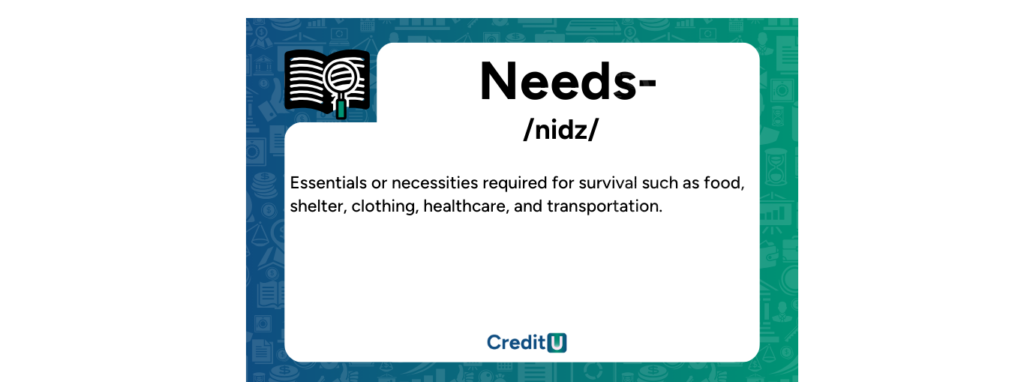Needs vs Wants – An In-depth Understanding
July 25, 2023
Today we live in a consumer-centric society. This makes it challenging to manage the gap between our needs and wants. Balancing our desires with our financial abilities is crucial for maintaining a healthy financial lifestyle. By understanding the distinction between needs vs wants, you can make more informed choices, prioritize our spending, and achieve better financial management.
Topics Covered: What are Needs? What are Wants? Finding the Balance Between Needs and Wants Taking Control of Your Finances How Can CreditU Help? Key Insights
What are Needs?
Simply put, needs are essential to your survival and well-being. These are the things you cannot afford to live without. Food, shelter, clothing, and health care are the most basic needs for a human. However, it is important to consider our individual circumstances when determining our needs. For example, if you are living in a cold climate, your needs will have to adjust to heating facilities and warm clothing. A
All of us has a financial need to cover the costs incurred on the above tangible categories. Therefore, your financial needs are what’s needed to be able to live and work. These are recurring expenses that you cannot forego.

Here are some of the most basic needs that is necessary for survival.
- Shelter: A basic, safe, and sanitary living space.
- Nutrition: Sufficient and balanced food intake necessary for health and survival.
- Clothing: Adequate clothing for protection against the elements.
- Healthcare: Medical services and medications needed to stay healthy.
- Education: Basic education to develop essential life skills and knowledge.
Essentially, Needs are expenses that are necessary to function in your daily life. When you’re budgeting your monthly take-home pay, prioritize these needs first. This portion of your budget is therefore more or less constant.
What are Wants?
Unlike needs, wants are things that enhance our lives but are not essential for our survival. These are often driven by personal desires, societal influences, or the need to keep up with the latest trends. Wants can be material possessions like the latest gadgets, designer clothes, or vacations. The cost you incur on these items are meant to help make life more enjoyable. An element of fun and leisure is almost always included. You don’t HAVE to have these luxuries to survive. Therefore, the money you allocate for your wants in your budget should be the first place to look if you are facing financial troubles.

Any leftover money from your budget – the discretionary income can be spent on your wants. Here are some examples for wants.
- Entertainment: Movies, shows, concerts, coffee dates.
- Eating out: Eating out, dinners, lunches that you may want to indulge in .
- Designer clothing: High-end, branded clothing, and accessories.
- Travel: Traveling for leisure. Expenses you incur to cover the cost of a vacation.
- Going with the trends: Owning the newest tech products in the market,
By recognizing the distinction between wants and needs, you can make conscious decisions about when to indulge in your desires and when not to. It is important to evaluate the long-term value and impact of wants on your overall financial well-being. Sometimes, delaying gratification and saving up for something you truly want can bring greater satisfaction and fulfillment.
Wants are non-essential desires that can enhance our lives but should be approached with caution. Understanding the factors that drive our wants and being mindful of our spending habits can help us strike a balance between fulfilling our desires and maintaining financial stability. By making conscious decisions about our wants, you can lead more fulfilling and financially responsible lives.
Finding the Balance Between Needs vs Wants
It’s essential to strike a balance between our needs and wants. It is human for us to desire things beyond our needs. However, our financial well-being depends on our ability to prioritize our needs over our wants. It’s easy to get caught up in the instant gratification, but taking a step back and evaluating our spending habits is a necessary first step.
Striking a Balance in Your Budget
Although it’s simply said, even needs have varying degrees depending on your financial ability. Satisfying the basic needs for food can be done by purchasing bargains or paying for all organic at a premium. Knowing what your budget allows you to do and identifying your personal goals play a pivotal role in striking the right balance.
On the other hand, wants are the desires and aspirations that go beyond our basic needs. They are the things we long for, but can live without. Wants can include items like luxury goods, vacations, and entertainment. While fulfilling our wants can bring us joy and satisfaction, it’s important to recognize that they are not essential for our survival.
One way to find the balance between needs and wants is by prioritizing our spending. By focusing on fulfilling our needs first, we ensure that our basic requirements are met before splurging in our wants. This means allocating a portion of our income towards necessities such as rent or mortgage payments, groceries, and utility bills. Once these needs are taken care of, we can then allocate a portion of our income towards our wants.
Mindful Spending
Another strategy is to practice mindful spending. This involves being conscious of our buying habits and considering the long-term impact of our choices. Before making a purchase, we can ask ourselves questions like, “Do I really need this?” “What are my alternatives?” By taking a moment to reflect on our wants, we can avoid impulsive buying and focus on buying what you actually need.
Keeping the End In Mind
It’s also important to consider your financial goals before you spend that extra buck. If you have specific objectives, such as saving for a down payment on a house or paying off debt, you may need to prioritize needs over wants for a period of time. This requires discipline. But it can ultimately lead to greater financial stability and freedom in the future.
Finding the balance between needs and wants is a crucial aspect of managing our finances.
- Understanding the difference between necessities and luxuries
- Prioritizing our spending, practicing mindful consumption, and
- Considering our long-term goals.
These are the three most basic ways to find the right balance between what you spend for your needs vs wants. The commitment to stick with your financial vision is more crucial than ever.
How to Take Control of Your Finances Through Understanding Needs vs Wants
Understanding the difference between needs and wants is the foundation for taking control of our finances. By prioritizing our needs and making conscious choices about our wants, we can establish a solid financial plan that aligns with our goals.
Create a Budget
Your key strategy to effectively manage our finances is by creating a budget. Start by listing all your essential needs. Allocate a predetermined amount towards each category. This ensures that your basics are taken care of before considering your wants. Assess your income and expenses regularly, adjusting as necessary to maintain a healthy balance.
Understanding needs vs wants is the foundation to achieving better financial management. By striking a balance between the two and being mindful of spending, you can make informed decisions and work towards financial goals. It’s not about depriving yourself but rather making choices that align with priorities and long-term financial well-being.
How Can CreditU Help You?
With the CreditU app, managing a budget is made simple! Our user-friendly onboarding will walk you through income, different expense categories and help you set financial goals to give you a overall picture at the convenience of your fingertips. This detailed budget inside CreditU can help you prioritize your needs and wants.
With CreditU, you’ll have a clear view of your complete financial picture. Simply connect your checking accounts, credit cards, and investment accounts for an all-in-one solution. Make informed decisions for your future with ease. Download CreditU today!
Key Insights – Understanding Needs vs Wants
1. Recognize the difference: Understanding what constitutes a need versus a want is essential in making wise financial decisions.
2. Prioritize necessities: Ensure that your needs are met before diving into fulfilling your wants.
3. Be mindful of overindulgence: While treating ourselves occasionally is not a bad thing, it’s important not to let our wants dictate our financial health.
4. Budgeting is key: Establishing a budget and regularly reviewing your expenses can help you stay on track and achieve your financial goals.
Last Updated on January 11, 2024 by Dilini Dias Dahanayake







